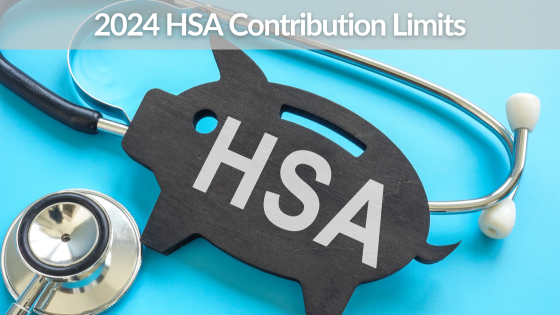As the mid-year enrollment period for some employers begins, staying informed about changes that can impact your personal finances is important. One recent change that garnered attention is the adjustment to Health Savings Account (HSA) contribution limits for 2024. Let's delve into the recent alterations and understand what they mean for individuals and families.

Starting in 2024, the maximum annual contribution limits for HSAs have increased.
These changes offer an opportunity for individuals and families to save even more on a tax-advantaged basis.
The adjusted HSA contribution limits offer several advantages. First and foremost, they provide an avenue for individuals to save more for their healthcare needs.
HSAs also offer triple tax benefits:
The contributions made to an HSA are generally tax-deductible, meaning they can be subtracted from your taxable income. This provides an immediate reduction in your tax liability. The deductible limit for HSA contributions is set annually by the Internal Revenue Service (IRS).
The funds deposited in an HSA can grow tax-free over time. Any interest, dividends, or capital gains earned on the investments held within the HSA are not subject to federal income tax. This allows your HSA balance to potentially increase over the years, helping you build up savings for future medical expenses.
The withdrawals made from an HSA are tax-free if used to pay for qualified medical expenses. Qualified medical expenses include a wide range of healthcare costs, such as doctor visits, prescription medications, hospital fees, dental care, vision expenses, and more. By using HSA funds to cover these expenses, you can effectively avoid paying taxes on the money you spend on healthcare.
However, it's essential to keep in mind that non-qualified withdrawals from an HSA may be subject to income tax and potentially incur a penalty, depending on your age and circumstances.
It's also worth noting that individuals aged 55 or older can make an additional catch-up contribution of $1,000.
The increased HSA contribution limits for 2024 provide an excellent opportunity for individuals and families to enhance their healthcare savings. Taking advantage of the triple tax benefits and carefully assessing your healthcare needs can help you make the most of these changes. In addition, by staying informed, you can leverage HSAs as a powerful tool in managing your healthcare expenses today and into the future.
Note: To be eligible for an HSA, you must be enrolled in a high-deductible health plan (HDHP). Before enrolling in this plan type, ensure this aligns with your healthcare preferences and needs.
If you are unsure how the HSA changes for 2024 may impact you during your open enrollment period, reach out to one of our financial planners for assistance. Your financial advisor can walk you through your personal situation to determine which benefit elections are best suited for you and your family.
There are many options and decisions to make, but you do not have to make them alone. Schedule a complimentary discovery call with one of our financial professionals to start the conversation today!
CRN202606-4493201

Jordan Bilodeau, CFP®, CEPA, is the Director of Planning & Strategy at Spaugh Dameron Tenny, where he leads firmwide planning initiatives and helps clients navigate complex financial decisions. With experience in portfolio design, tax strategies, and business succession planning, Jordan works with executives, physicians, dentists, and successful retirees to coordinate every aspect of their financial lives. He holds both the CERTIFIED FINANCIAL PLANNER® and Certified Exit Planning Advisor designations and has a Master’s degree in Wealth and Trust Management, providing tailored guidance for clients.
Understanding how much you can contribute toward retirement each year helps you stay on track with long-term financial goals and avoid surprises at ...
Read More →A common question we receive during this time of year has to do with employee benefits. Most employers are hosting open enrollment to sign up for ...
Read More →The median retirement age in the U.S. is 62, with seven out of ten retirees stopping work before age 65. This means that a significant majority of ...
Read More →